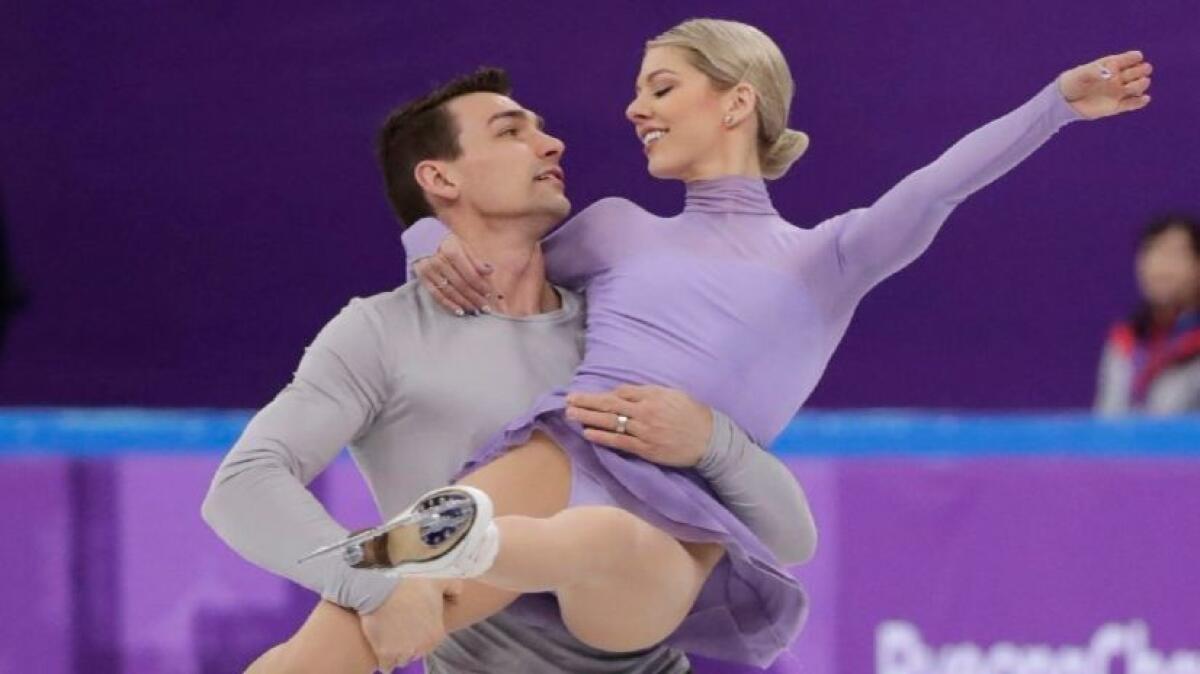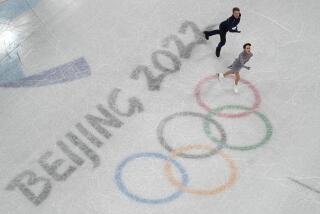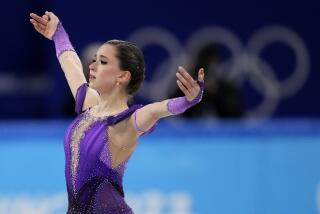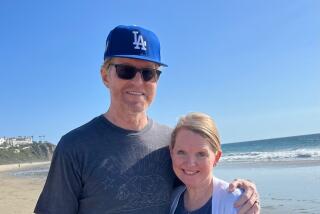Olympics pairs skater Chris Knierim honors his late stepfather, an Army veteran

The American flag was slowly raised up the silver pole, higher and higher into the dark, brittle night. Siberian wind gusts blew down from the mountains through the valley and across the plaza, so the flag didn’t hang limply when it got to the top.
It snapped to attention.
It saluted Jeff Knierim.
Chris Knierim, his son, was below, standing on a podium alongside U.S. figure skaters who won the bronze medal in the three-day team competition at the Winter Olympics. Knierim and wife Alexa skated twice as pairs, and they’ll skate twice more in the individual pairs competition later in the week at Gangneung Ice Arena.
There’s still work to be done, jumps to land, throws to execute, spins to synchronize, and Chris has maintained a stoic demeanor — the steeled focus of a competitor. But for a moment Monday, he allowed his mind to drift, allowed the memories to flood back, allowed his emotions to win, watching the symbol of everything his father represented climb into an inky sky.
“I know,” Chris said, “he’s proud of me.”
Jeff Knierim was born into a longtime San Diego family and attended Hoover High, where he played football and wrestled. He went on a Mormon mission to Germany. He returned home, joined the Army and deployed to Desert Storm as part of the 3rd Armored Division.
In March 1991, a few weeks after the liberation of Kuwait, the Army was ordered to destroy the massive Khamisiyah munitions depot in southern Iraq before departing the country. The details of what happened remain fuzzy, leaking out through the years after the Department of Defense and CIA initially denied them.
Engineers detonated Bunker 73, an earthen pit of 122-millimeter rockets filled with sarin gas and other forms of deadly nerve agents. The toxic plume, according to some reports, was a mile high and five miles wide, and winds blew it over an estimated 100,000 troops, maybe more.
The 3rd Armored Division was among them.
“That was real,” said Tyson Knierim, Chris’ older brother. “It happened to our family.”
The exposure to sarin gas has been blamed for Gulf War Illness and a slew of other medical complications faced by veterans of Desert Storm, and Knierim’s family links it to Jeff’s deteriorating health after coming home. DeeDee, his widow, says he suffered from systemic lupus and depleted uranium that prevented him from re-enlisting in 2001. Instead, he worked as an IT network engineer for Cisco Systems and supported four children — Chris and Tyson from DeeDee’s previous marriage, and two of their own — while living in Ramona, Calif.
Last April, Jeff died from a brain aneurysm. He was 49.
Chris, at age 30, was preparing for what probably would be one final run at the Winter Olympics after missing out in 2014 because of a broken leg. Alexa, his wife, had just recovered from a mysterious intestinal disorder that required three abdominal surgeries and nearly killed her. Now his father was gone.
“I was crushed. Devastated. Broken,” Chris wrote on a social media post. “But again, I was brave on the outside. After all, we were heading into the Olympic season and there was no time to cry. I worked through the days I was empty inside and skated for the pride of my father. I wanted to make his sacrifices for me worthwhile.”
Jeff began dating DeeDee when Chris was 6 months old and raised him as his own, transferring his love of fixing cars, instilling his sense of purpose, enabling his dreams. The family moved from Ramona to Colorado Springs when Chris was 17 so he could train with a world-class pairs coach. When Chris’ costume for the World Championships cost $1,500, Jeff sold one of the family cars to pay for it.
Whenever Chris was introduced at an international competition as “representing the United States,” Jeff, the hardened soldier, teared up.
In the days before his death, he sent Chris and Alexa a final message: “Being WARRIORS is in your blood, just let it out and you will conquer every goal you set. So proud of you two. It’s more than a dad could ever express.”
There is sorrow in his absence, grief, anguish. There is no bitterness or resentment, not at the cruel twists of life, not at the government he served for misjudging the contents of Bunker 73 or its subsequent reluctance to admit it.
“It’s the mindset that our dad taught us,” said Tyson, who teaches seventh-grade history and is the wrestling coach at CIF champion Ramona High. “You choose that path, you make that choice, and if something happens, something happens. You kind of know it when you jump in. You just do it.
“What happened to my dad, we’re not happy about it and he wasn’t happy about it. He hated it. But he would never, ever give up his service for a second. I know Dad would go back and serve again, no matter what.”
The anthem and the flag, then, have become raw, powerful reminders of that sacrifice. “A whole other dynamic that makes it not routine,” said Tyson, who is in South Korea. On Monday, Chris stared at the stars and stripes as they were slowly raised in the Pyeongchang Medals Plaza, his eyes never straying, the memories flooding back, the suppressed emotions bubbling to the surface.
“I love our flag and I love our country, and I’m very proud that he fought for our country and served our country,” Chris said. “I’m serving it in a little different way, but I’m very happy about it, very fortunate to be at the Olympic Games and win a medal, very proud. I was fortunate to have him as long as I did. I always wish he was here, but I know he’s looking down, watching.”
A bronze medal wasn’t the only thing hanging from his neck. Inside his shirt, pressed against his chest, a gift from his mother, were his father’s military dog tags.
Above him the flag stood at attention in the arctic gusts that plunged the wind chill below zero. And for a moment, he didn’t feel the cold.
Zeigler is a reporter for the San Diego Union-Tribune.
More to Read
Go beyond the scoreboard
Get the latest on L.A.'s teams in the daily Sports Report newsletter.
You may occasionally receive promotional content from the Los Angeles Times.






